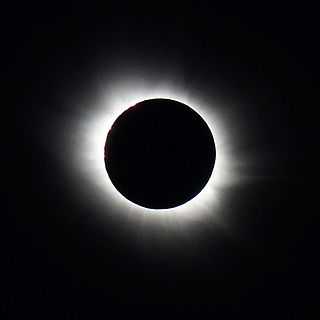Solar eclipse of April 25, 1865
| Solar eclipse of April 25, 1865 | |
|---|---|
 Map | |
| Type of eclipse | |
| Nature | Total |
| Gamma | -0.4826 |
| Magnitude | 1.0584 |
| Maximum eclipse | |
| Duration | 323 sec (5 m 23 s) |
| Coordinates | 14°48′S 25°48′W / 14.8°S 25.8°W |
| Max. width of band | 219 km (136 mi) |
| Times (UTC) | |
| Greatest eclipse | 14:08:34 |
| References | |
| Saros | 136 (29 of 71) |
| Catalog # (SE5000) | 9199 |
A total solar eclipse occurred on April 25, 1865. A solar eclipse occurs when the Moon passes between Earth and the Sun, thereby totally or partly obscuring the image of the Sun for a viewer on Earth. A total solar eclipse occurs when the Moon's apparent diameter is larger than the Sun's, blocking all direct sunlight, turning day into darkness. Totality occurs in a narrow path across Earth's surface, with the partial solar eclipse visible over a surrounding region thousands of kilometres wide.
Observations

Related eclipses
It is a part of solar Saros 136.
References
- NASA chart graphics
- Googlemap
- NASA Besselian elements
- Total Eclipses of the Sun by Mabel Loomis Todd, 1900
| Wikimedia Commons has media related to Solar eclipse of 1865 April 25. |

